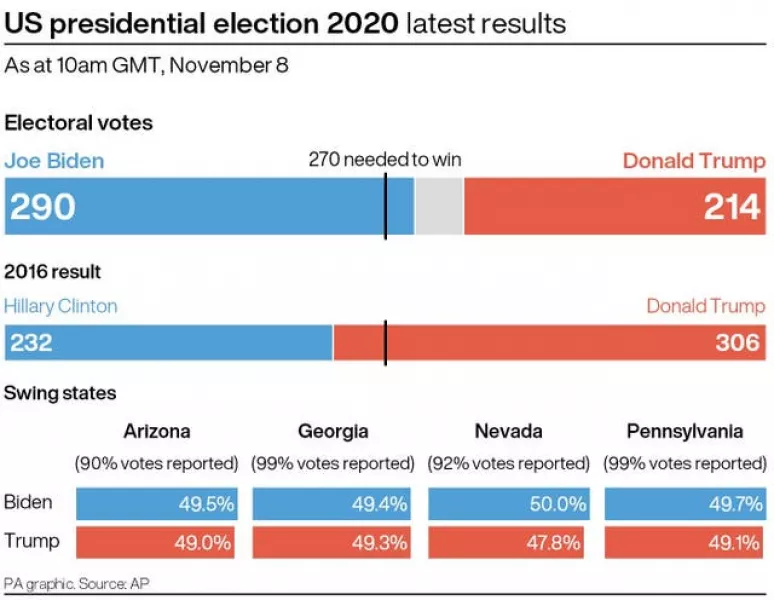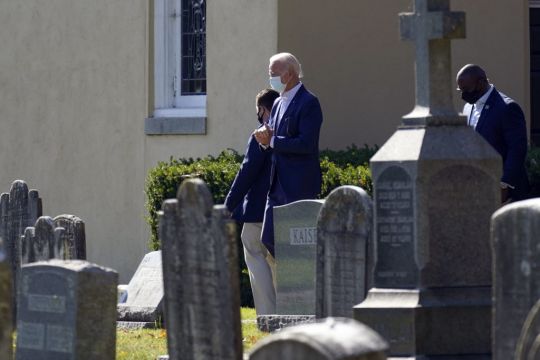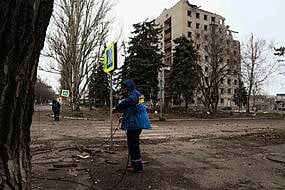President-elect Joe Biden signalled on Sunday that he plans to move quickly to build out his government, focusing first on the pandemic that will likely dominate the early days of his administration.
Mr Biden named a former surgeon general, Dr Vivek Murthy, and a former Food and Drug Administration commissioner, David Kessler, as co-chairs of a coronavirus working group set to get started, with other members expected to be announced on Monday.
Transition team officials said that also this week Mr Biden would launch his agency review teams, the group of transition staffers that have access to key agencies in the current administration to ease the transfer of power.

The teams would collect and review information such as budgetary and staffing decisions, pending regulations and other work in progress from current staff at the departments to help Mr Biden’s team prepare to transition.
“People want the country to move forward,” said Kate Bedingfield, Mr Biden’s deputy campaign manager, in an interview on NBC’s Meet The Press, and see Mr Biden and vice president-elect Kamala Harris “have the opportunity to do the work, to get the virus under control and to get our economy back together”.
It is unclear for now whether president Donald Trump and his administration will co-operate. He has yet to acknowledge Mr Biden’s victory and has pledged to mount legal challenges in several closely contested states that decided the race.
On Sunday afternoon, a bipartisan group from the last three White Houses urged the Trump administration to move forward “to immediately begin the post-election transition process”.
The call came from the Centre for Presidential Transition advisory board and was signed by officials from the administrations of Republican president George W Bush and Democrats Bill Clinton and Barack Obama.
“This was a hard-fought campaign, but history is replete with examples of presidents who emerged from such campaigns to graciously assist their successors,” members of the advisory board said in a statement.
Formal recognition of a new administration by its predecessor is necessary to free up money needed for the handover of power and trigger the transition process at government agencies.
There were signs that leaders in Washington and abroad were preparing for a new administration.
Mr Biden’s aides said the president-elect and transition team had been in touch with Republican politicians.
Israel’s prime minister, Benjamin Netanyahu, one of Mr Trump’s closest allies, opened a Cabinet meeting on Sunday by congratulating Mr Biden, a former vice president and long-time senator.
“I have a long and warm personal connection with Joe Biden for nearly 40 years, and I know him as a great friend of the state of Israel,” Mr Netanyahu said.
“I am certain that we will continue to work with both of them in order to further strengthen the special alliance between Israel and the US.”
Mr Bush, the sole living Republican former president, also wished Mr Biden well.
“Though we have political differences, I know Joe Biden to be a good man, who has won his opportunity to lead and unify our country,” Mr Bush said.
Mr Biden faces key staffing decisions in the days ahead. The 10-week transition period before Inauguration Day on January 20 has already been shortened by the extra time it has taken to determine the winner of Tuesday’s election.

The second Catholic to be elected president, Mr Biden started his first full day as president-elect by attending church at St Joseph on the Brandywine near his home in Wilmington, as he does nearly every week.
After the service, he visited the church cemetery where several family members have been laid to rest, including his late son, Beau.
Beau Biden, a former Delaware attorney general, died in 2015 from cancer. Before his death, he had encouraged his father to make a third run for the White House.
Mr Biden said in a victory speech on Saturday that he would announce a task force of scientists and experts on Monday to develop a “blueprint” to begin beating back the virus by the time he assumes the presidency.
He said his plan would be “built on bedrock science” and “constructed out of compassion, empathy and concern”.
Mr Biden’s senior adviser Ted Kaufman said the transition team would focus on the “nuts and bolts” of building the new administration in coming days.

Mr Biden may not make top Cabinet choices for weeks. But he built his presidential run around bipartisanship and he has spent the days since Tuesday’s election pledging to be a president for all Americans. That suggests he could be willing to appoint some Republicans to high-profile administration positions.
Many former Republican officeholders broke with Mr Trump to endorse Mr Biden’s campaign. Mr Biden’s selection of some of them to join the new government could appease Senate Republicans, who may have to confirm many of Mr Biden’s choices for top jobs. The Republican Party could retain control of the chamber after two special elections in Georgia on January 5.
Still, too much across-the-aisle co-operation could draw the ire of progressives. Some already worry that unco-operative Senate Republicans could force Mr Biden to scale back his ambitious campaign promises to expand access to health care and lead a post-pandemic economic recovery that relies on federal investment in green technology and jobs to help combat climate change.
Mr Biden’s efforts at bipartisan reconciliation could still be derailed by Mr Trump’s refusal to concede the race.
Symone Sanders, a Biden campaign senior adviser, said that while several Republican politicians had been in contact with the president-elect in recent days, the campaign had yet to hear from Trump White House officials.
Republican Senator Mitt Romney said Mr Trump had a right to pursue recounts and legal challenges. But he noted that those efforts would be unlikely to change the outcome and he urged the president to dial back his rhetoric.







